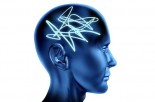Bipolar disorder is a condition that is often misunderstood; not only by the general population, but also within the medical community.
In fact, there are many misconceptions about what bipolar actually means.
Unfortunately, Melody Moezzi felt the brunt of those misconceptions for years before finally being diagnosed with bipolar disorder.
She struggled with both "poles" of the condition: the manic side as well as the depression side.
The depression side is very similar to the typical symptoms of unipolar depression: low energy, helplessness, feelings of worthlessness and guilt.
On the manic side, symptoms include high energy, heightened irritability, racing thoughts, impulsive behaviors and poor judgement.
The tricky part is that the two poles don't always stay that way. Sufferers of bipolar can have mixed episodes of both mania and depression. Suicide is more common in these mixed episodes.
There is also a bipolar spectrum, as well as a differentiation between bipolar-1 and bipolar-2. The varying symptoms and intensities of the disorder contributes to the high rate of misdiagnosis.
Not being properly diagnosed becomes problematic when it comes to treatment. Medications for unipolar depression actually exacerbate bipolar disorder symptoms. This is why it is so essential to get an accurate diagnosis up front.
What treatments are available for bipolar disorder?
Depending on where you fall on the spectrum, treatment options can vary. Even those who fall on the same level of the spectrum may need different types of medications.
Many bipolar patients tend to be over-medicated, oftentimes because their doctors don't fully understand (or don't take the time to understand) individual symptoms and. This is where patient responsibility is so crucial. You shouldn't have to be taking more medication than you need because you have a doctor who is "lazy."
Is there a connection between violence and bipolar disorder?
While the media likes to portray an intimate relationship between violence and mental illness, especially in the wake of mass shootings or other violent incidents, you're not getting the full story.
There are more than twice as many suicides as homicides in the U.S. More than 100 people take their lives every day.
Gun control is a mental health issue, but not for the reasons that the mainstream media would have you think. A startling two-thirds of all gun fatalities are suicides and more than half of all suicides are gun related. As Moezzi puts it, "We're not getting guns and going out and killing other people... we're killing ourselves."
What are some behaviors that might indicate bipolar disorder?
While depressive thoughts and feelings are sometimes easier to identify, it's important to also recognize the presence of mania.
Racing thoughts or having flights of ideas which connect in your own brain but don't make sense to anyone else can be common indicators.
If you're sleeping very little, that can also be a sign of a manic episode.
If you or someone you know is suffering from bipolar, it's of utmost importance that you seek out help. Many people are ashamed of their mental illnesses, and it's no wonder. The stigma of mental illness is very disabling, far more than some physical illnesses. But ultimately, you need to look out for your well-being and that of your loved ones.
Moezzi joins Andrea and Lisa to share her personal struggle with bipolar, as well as share the truth behind the media's sensationalism of violence and mental illness.
Wednesday, 30 July 2014 11:22
Violence & Mental Illness: Understanding Bipolar Disorder
Bipolar disorder is often misunderstood; not only by the general population, but also within the medical community.
Additional Info
- Segment Number: 3
- Audio File: naturally_savvy/1431ns3c.mp3
- Featured Speaker: Melody Moezzi, author
- Book Title: Haldol and Hyacinths: A Bipolar Life
- Guest Website: Melody Moezzi
- Guest Facebook Account: https://www.facebook.com/melodymoezzi?fref=ts&ref=br_tf
- Guest Twitter Account: @melodymoezzi
- Guest Bio: Melody Moezzi (pronounced like Noisy with an "M") is an activist, attorney and award-winning author. Her latest book is Haldol and Hyacinths: A Bipolar Life, a critically acclaimed memoir that interweaves her experiences with both clinical and cultural bipolarity as an Iranian-American Muslim. She has written for the New York Times, Washington Post, Guardian and many other media outlets.
-
Transcription:
- Length (mins): 10
- Waiver Received: Yes
- Internal Notes: repeat guest
- Host: Andrea Donsky, RHN and Lisa Davis, MPH
Published in
Naturally Savvy
Tagged under
